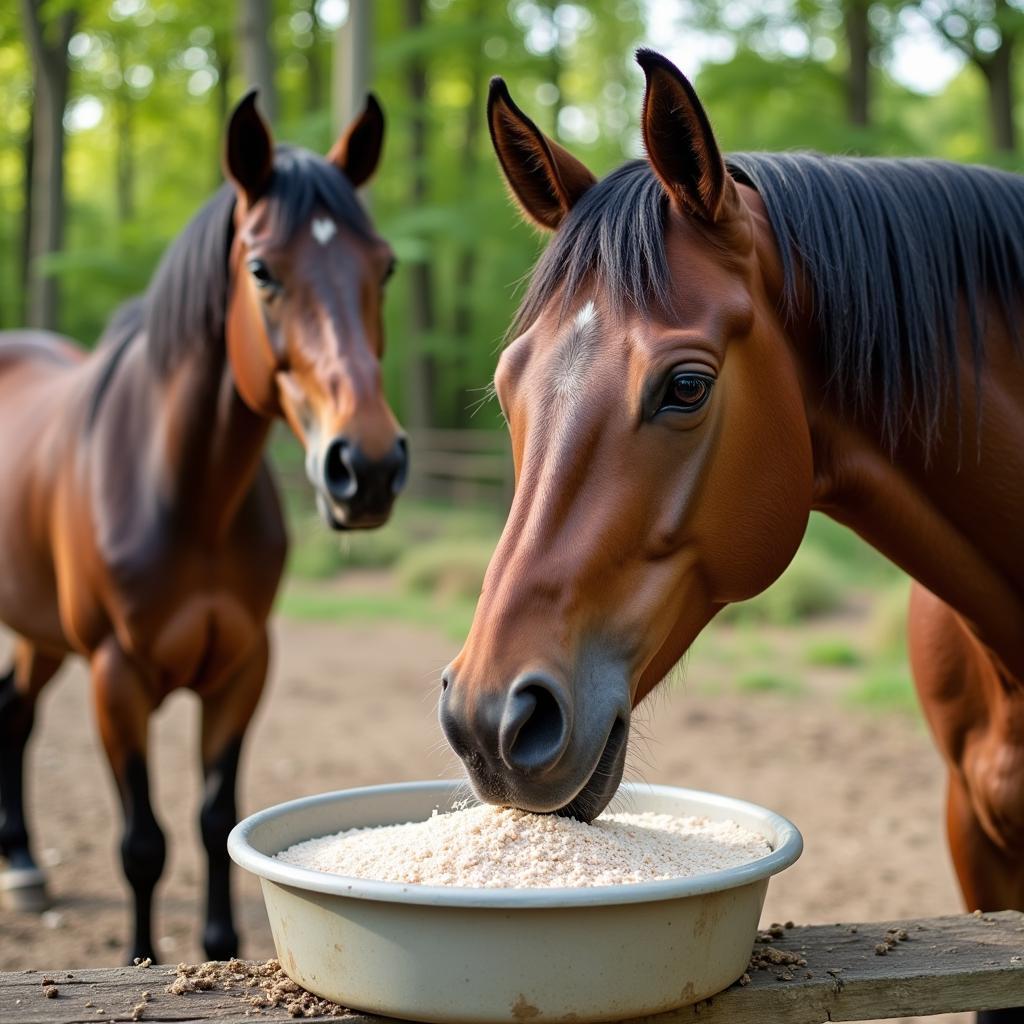Providing Loose Salt And Minerals For Horses is a fundamental aspect of equine care. Understanding their importance and how to offer them correctly ensures your horse receives the necessary nutrients for optimal health and performance.
Why Loose Salt and Minerals are Crucial for Your Horse’s Wellbeing
Horses lose essential electrolytes through sweat, especially during exercise or in hot weather. Loose salt and minerals replenish these vital nutrients, including sodium, chloride, potassium, calcium, and magnesium. These minerals play crucial roles in various bodily functions such as muscle contraction, nerve transmission, fluid balance, and bone health. A deficiency in these essential nutrients can lead to dehydration, muscle weakness, poor performance, and various health problems. Providing a horse salt block can be an additional way to ensure your horse has access to necessary sodium.
Horses, like all living creatures, have specific nutritional requirements. Providing the correct balance of loose salt and minerals is vital to support these needs. For example, a horse in heavy work will require a higher intake of electrolytes compared to a horse at rest. Understanding these nuanced needs is essential for responsible horse ownership.
Choosing the Right Loose Salt and Minerals
Selecting the appropriate loose salt and mineral mix for your horse can be daunting with the array of options available. Consider factors such as your horse’s age, activity level, and overall health. Consult with your veterinarian or an equine nutritionist to determine the best loose minerals for horses specific to your horse’s individual needs. They can help you evaluate whether a trace mineral block for horses might also be beneficial.
Different Types of Loose Salt and Mineral Supplements
Various forms of loose salt and mineral supplements are available, including plain white salt, mineral mixes, and electrolyte supplements. Each offers distinct benefits. Plain white salt provides sodium and chloride, while mineral mixes offer a broader spectrum of essential nutrients. Electrolyte supplements are specifically formulated to replenish electrolytes lost through sweat. Understanding the differences between these options enables you to make an informed choice for your horse.
How to Offer Loose Salt and Minerals to Your Horse
Offering loose salt and minerals correctly is crucial for ensuring your horse receives the intended benefits. Provide the supplements in a clean, accessible container, such as a sturdy bucket or feeder. Place the container in a convenient location in your horse’s stall or pasture. Ensure fresh water is always available alongside the supplements. Monitor your horse’s intake and adjust the amount offered as needed, keeping in mind that over-supplementation can be harmful. Do horses need a salt block in addition to loose minerals? Find out more in our dedicated article do horses need a salt block.
Preventing Overconsumption
While providing ample loose salt and minerals is important, overconsumption can be detrimental to your horse’s health. Monitor your horse’s intake regularly. Avoid offering excessive amounts, which can lead to electrolyte imbalances. Signs of overconsumption may include excessive thirst, frequent urination, and even colic. If you suspect your horse has consumed too much salt or minerals, consult your veterinarian immediately.
“Proper mineral supplementation is essential for maintaining a horse’s health and performance. Just like us, they need the right balance of nutrients to thrive.” – Dr. Emily Carter, Equine Veterinarian
What are the signs of mineral deficiency in horses?
Signs of mineral deficiency can be subtle, but observing your horse closely can help you identify potential issues. Look for changes in appetite, dull coat, decreased energy levels, or unusual behaviors like chewing on wood. If you notice any of these signs, consult your veterinarian to assess your horse’s mineral status.
“Mineral imbalances can manifest in various ways, affecting everything from a horse’s coat condition to its overall performance. Regular veterinary checkups are key to catching these issues early.” – Dr. John Miller, Equine Nutritionist
Conclusion
Providing loose salt and minerals for horses is a crucial aspect of responsible horse ownership. By understanding the importance of these essential nutrients, choosing the right supplements, and offering them correctly, you can ensure your horse receives the necessary support for optimal health, wellbeing, and performance. A comprehensive approach to mineral supplementation, including considering a horse mineral block, contributes significantly to your horse’s overall health and vitality.
 A healthy horse benefits from access to loose salt and minerals.
A healthy horse benefits from access to loose salt and minerals.
FAQ
- How much loose salt should I give my horse daily?
- What are the signs of a mineral deficiency in horses?
- Can I mix loose minerals with my horse’s feed?
- What type of container is best for offering loose minerals?
- How often should I clean my horse’s mineral feeder?
- Are salt licks a good alternative to loose salt?
- What are the benefits of using a trace mineral block?
Need more information? Check out these related articles:
Need assistance? Contact us 24/7:
Phone: 0772127271
Email: [email protected]
Address: QGM2+WX2, Vị Trung, Vị Thuỷ, Hậu Giang, Việt Nam.